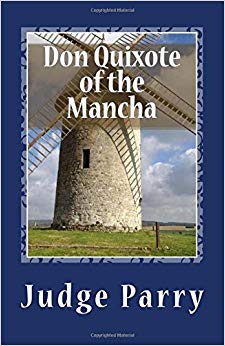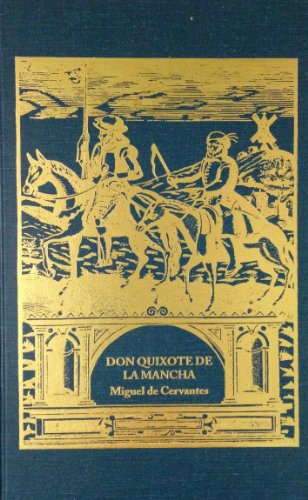-
The Ingenious Gentleman Don Quixote of La Mancha
Miguel de Cervantes
eBook (DB Publishing House, Sept. 11, 2011)The protagonist of the book is Alonso Quixano (or Quijano), a retired country gentleman nearing 50 years of age, who lives in an unnamed section of La Mancha with his niece and a housekeeper. He has become obsessed with books of chivalry, and believes their every word to be true, despite the fact that many of the events in them are clearly impossible. Quixano eventually appears to other people to have lost his mind due to lack of sleep and food from dedicating all of his time to reading.Includes a biography of the Author
-
Don Quixote of the Mancha
Judge Parry, Miguel de Cervantes, Walter Crane
Hardcover (Everyman's Library, Sept. 21, 1999)The story of the Spanish knight whose devotion to tales of chivalry leads him and his faithful squire, Sancho Panza, into a series of bizarre adventures blends fantasy, comedy, and drama in a way that has gripped the world's imagination for centuries. This edition has been abridged and adapted for children, and enhanced by the delightful illustrations of Walter Crane.
-
Don Quixote de La Mancha
Miguel De Cervantes Saavedra, Samuel Putnam
Hardcover (Modern Library, Aug. 16, 1998)" Don Quixote is practically unthinkable as a living being," said novelist Milan Kundera. "And yet, in our memory, what character is more alive?"----Widely regarded as the world's first modern novel, Don Quixote chronicles the famous picaresque adventures of the noble knight-errant Don Quixote de La Mancha and his faithful squire, Sancho Panza, as they travel through sixteenth-century Spain. This Modern Library edition presents the acclaimed Samuel Putnam translation of the epic tale, complete with notes, variant readings, and an Introduction by the translator.----The debt owed to Cervantes by literature is immense. From Milan Kundera: "Cervan-tes is the founder of the Modern Era. . . . The novelist need answer to no one but Cervantes." Lionel Trilling observed: "It can be said that all prose fiction is a variation on the theme of Don Quixote." Vladmir Nabo-kov wrote: "Don Quixote is greater today than he was in Cervantes's womb. [He] looms so wonderfully above the skyline of literature, a gaunt giant on a lean nag, that the book lives and will live through [his] sheer vitality. . . . He stands for everything that is gentle, forlorn, pure, unselfish, and gallant. The parody has become a paragon." And V. S. Pritchett observed: "Don Quixote begins as a province, turns into Spain, and ends as a universe. . . . The true spell of Cervantes is that he is a natural magician in pure story-telling."The Modern Library has played a significant role in American cultural life for the better part of a century. The series was founded in 1917 by the publishers Boni and Liveright and eight years later acquired by Bennett Cerf and Donald Klopfer. It provided the foun-dation for their next publishing venture, Random House. The Modern Library has been a staple of the American book trade, providing readers with affordable hardbound editions of important works of literature and thought. For the Modern Library's seventy-fifth anniversary, Random House redesigned the series, restoring as its emblem the running torchbearer created by Lucian Bernhard in 1925 and refurbishing jackets, bindings, and type, as well as inaugurating a new program of selecting titles. The Modern Library continues to provide the world's best books, at the best prices.
-
Don Quixote of the Mancha
Miguel De Cervantes, Walter Crane
eBook (Everyman's Library, Oct. 1, 2014)The story of the Spanish knight whose devotion to tales of chivalry leads him and his faithful squire, Sancho Panza, into a series of bizarre adventures blends fantasy, comedy, and drama in a way that has gripped the world's imagination for centuries. This edition has been abridged and adapted for children, and enhanced by the delightful illustrations of Walter Crane.
-
Don Quixote of La Mancha
Miguel de Cervantes, John Ormsby, Ilan Stavans
Paperback (Restless Books, Oct. 6, 2015)Newly introduced by leading Quixote scholar Ilan Stavans, this 400th Anniversary edition of Don Quixote of La Mancha—called the most popular book in history after the Bible and the first modern novel—inaugurates Restless Classics: interactive encounters with great books and inspired teachers. Each Restless Classic is beautifully designed with original artwork, a new introduction for the trade audience, and a video teaching series and live online book club discussions led by passionate experts. Described as “the novel that invented modernity,” Miguel de Cervantes’s Don Quixote of La Mancha has become since its publication in Spain in two parts—the first in 1605, the second in 1615—a machine of meaning, endlessly adapted into ballet, theater, dance, film, music, and television, not to mention a veritable tourist industry. Lionel Trilling argued that “all prose fiction is a variation on the theme of Don Quixote.” Mark Twain was a passionate fan. Flaubert modeled Madame Bovary after it. Dostoyevsky reimagined its protagonist in The Idiot. And Borges, in his story about Pierre Menard, looked at it as the gravitational center of Hispanic civilization. Milan Kundera fittingly summarized this unstoppable devotion when he said that “Cervantes teaches the reader to comprehend the world as a question.” Of course, Don Quixote has its detractors, too. Nabokov, for instance, maintained it was one of the cruelest narratives ever. Still, after 400 years, the book remains with us, winding improbably through history like the famous errant knight and his companion, Sancho Panza. The commemorative Restless Classics edition, published on the four-hundredth anniversary of its full release, features John Ormsby’s canonical English translation, illustrations by award-winning Mexican artist Eko, and an insightful, thought-provoking introduction by Ilan Stavans, one of the foremost public intellectuals today. Don Quixote, Stavans writes, is “not only a novel but a manual of life. You’ll find in it anything you need, from lessons on how to speak and eat and love to an exhortation of a disciplined, focused life, an argument against censorship, and a call to make lasting friends, which, in Cervantes’s words, is ‘what makes bearable our long journey from birth to death’.” The volume includes access to an interactive series of video lectures by Stavans, available online at restlessbooks.com/quixote. The videos serve as map to this restless classic, which speaks more eloquently than ever to our perennial desire to sacrifice for a dream in order to see its true worth.
-
Don Quixote of the Mancha
Judge Parry
Paperback (CreateSpace Independent Publishing Platform, )None
-
Don Quixote of the Mancha
Ed. Eliot, Charles
Hardcover (P. F. Collier & Son Corp., Aug. 16, 1970)Interspersed among these adventures are a series of stories and moral tales, illustrating the pastoral storytelling tradition in Spain. As well, there are two long, learned disquisitions, delivered by Quixote. The first is a description of the Golden Age of mythology, told during a supper shared with some unlettered goatherds who don't understand a word he says. Later on, Quixote addresses a company during dinner at an inn in a debate about whether the career of arms is superior to that of letters, or vice versa. Throughout the adventures it becomes clear that Quixote, for all his seeming madness, is a mild-mannered, empathetic man, genuine in his concern for chivalric ideals. Although he has agendas of his own, Sancho Panza has come to believe in and show loyalty to his new master. But in spite of all his good intentions, Quixote's quest leads him to be returned home, imprisoned in a cage on an ox-cart by his village priest and barber for Don Quixote's own good.
-
The Ingenious Gentleman Don Quixote of La Mancha
Miguel de Cervantes Saavedra, John Ormsby
Hardcover (Andesite Press, Aug. 12, 2015)This work has been selected by scholars as being culturally important, and is part of the knowledge base of civilization as we know it. This work was reproduced from the original artifact, and remains as true to the original work as possible. Therefore, you will see the original copyright references, library stamps (as most of these works have been housed in our most important libraries around the world), and other notations in the work. This work is in the public domain in the United States of America, and possibly other nations. Within the United States, you may freely copy and distribute this work, as no entity (individual or corporate) has a copyright on the body of the work.As a reproduction of a historical artifact, this work may contain missing or blurred pages, poor pictures, errant marks, etc. Scholars believe, and we concur, that this work is important enough to be preserved, reproduced, and made generally available to the public. We appreciate your support of the preservation process, and thank you for being an important part of keeping this knowledge alive and relevant.
-
Don Quixote De LA Mancha
Miguel de Cervantes Saavedra, Mary E. Burt, Lucy Leffingwell Cable Bikle
Hardcover (Amereon Ltd, June 1, 1978)None
-
Don Quixote of the Mancha
Miguel de Cervantes, Charles W. Eliot, Thomas Shelton
Hardcover (Grolier Enterprises Corp., Aug. 16, 1991)None
-
Don Quixote of la Mancha
MIGUEL DE CERVANTES SAAVEDRA
eBook (, April 24, 2020)It was with considerable reluctance that I abandoned infavor of the present undertaking what had long been afavorite project, that of a new edition of Shelton’s “ Don Quixote,” which has now become a somewhat scarce book. Thereare some —and I confess myself to be one —for whom Shelton’s racy old version, with all its defects, has a charm thatno modern translation, however skilful or correct, could possess.Shelton had the inestimable advantage of belonging to thesame generation as Cervantes ; Don Quixote ” had to him avitality that only a contemporary could feel ; it cost him nodramatic effort to see things as Cervantes saw them ; there isno anachronism in his language ; he put the Spanish of Cervantes into the English of Shakespeare. Shakespeare himselfmost likely knew the book ; he may have carried it home withhim in his saddle-bags to Stratford on one of his last journeys,and under the mulberry tree at New Place joined hands witha kindred genius in its pages.But it was soon made plain to me that to hope for evena moderate popularity for Shelton was vain. His fine oldcrusted English would, no doubt, be relished by a minority,but it would be only by a minority. His version has strongclaims on sentimental grounds, but on sentimental groundsonly. His warmest admirers must admit that he 'is not a satisfactory representative of Cervantes. His translation of theFirst Part was very hastily made —in forty days he says inhis dedication —and, as his marginal notes show, never re- vised by him. It has all the freshness and vigor, but also afull measure of the faults, of a hasty production.
-
Don Quixote de la Mancha
Miguel de Cervantes Saavedra
Hardcover (Barnes & Noble Books, Jan. 1, 1995)Text: English (translation) Original Language: Spanish